On the eve of the Day of Cosmonautics, people more often start thinking about global issues - is astronautics developing or stagnating? Will we ever see a rapidly developing Martian colony in our lifetime, or, at best, only a few new probes and rovers? Personally, I have a feeling that we will not see “caravans of rockets from star to star” and “apple trees on Mars” in the 21st century, but, in general, this is not scary, and astronautics is still cool and interesting. And it will develop, albeit not exponentially. And on the background, on the one hand, dreamers without brakes and, on the other hand, desperate and anticosmites, I would like to call this position cosmic realism.
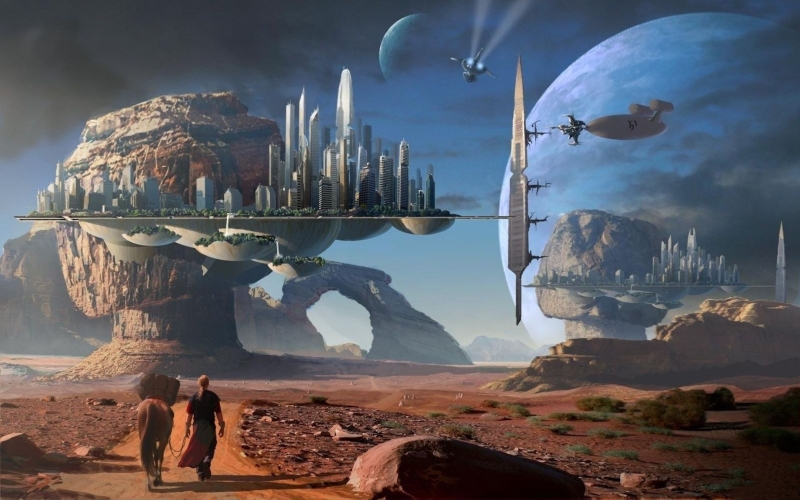
Frontiers of expansion
The ancient Greeks came up with a special word for the part of the world mastered by humanity - Oikumena. What factors determine its boundaries? Let's look at historical analogies.
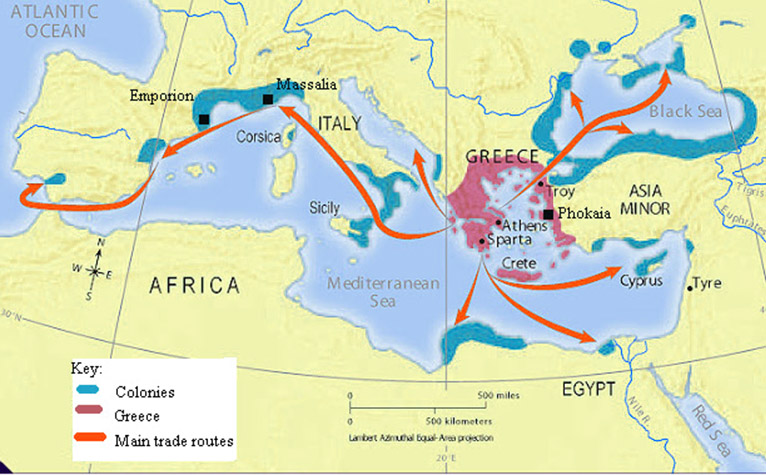 Map of ancient greek colonies, 8-6 BC.
Map of ancient greek colonies, 8-6 BC.Please note that the Greek colonies can be far removed from Greece proper, but do not go deep into the land. The reason is simple - the civilization of ancient Greece relied on the sea and galleys. With the distance from the coast, the connection with the metropolis, which was at the highest level among the Greeks, sharply deteriorated - the colonies were organized in an orderly manner and could receive help from the parent city.
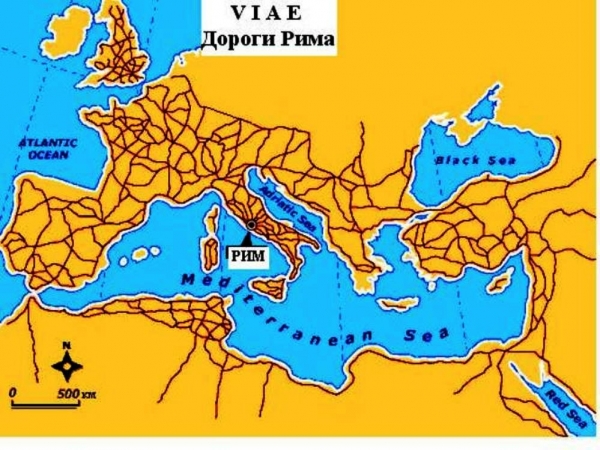 Road Map of Ancient Rome
Road Map of Ancient RomeIn terms of infrastructure organization, Rome was the opposite of Greece. Roman
tellurocracy built roads, some of which have been preserved and are still in use. And the road map shows the limits to the spread of the Roman Empire. In the south was the desert. In the west - the sea, and the technology to cross it from the Romans was not. Civilizations lived in the southeast, the only ones who managed to find what to oppose to invincible legions. Only the hard Parthian cavalry and horse archers stopped the perfect Roman war machine. But what was in the northeast? Why the ancient Romans did not reach the area of today's Moscow? The resistance of the barbarian tribes had an impact, but the main reason was the combination of climate and available technology. Roman roads stopped at the line of January zero isotherm - “grape lines”. To the north and east of it, Roman agriculture broke, and without food, "there wasn’t much food and no syudy."

Fast forward to modernity. The photograph shows an abandoned village in the Atacama Desert. This is one of the most arid regions of the Earth, it is often compared to Mars, and instruments, like those on the Vikings that explored the red planet, could not find life here. Sometime around 170 villages were built there, in which miners lived who mined saltpeter, but in the 1940s there appeared technologies for its cheap industrial synthesis, and people lost the sense of living in such difficult conditions. A similar story occurred with the Soviet / Russian Arctic — a region once inhabited by geopolitical reasons began to lose population dramatically in the changing economic situation. And only now the melting of the ice and the potential benefits of the Northern Sea Route again attract the attention of states, which is likely to result in an increase in population.
Conclusion: The boundaries of the Ocumene are mainly determined by technology and economy.
Motivation and opportunities
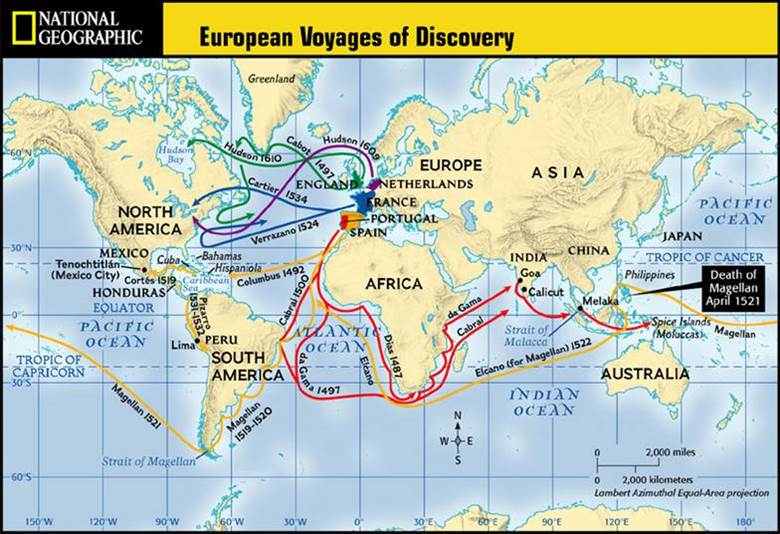 The most important expeditions of the era of great geographical discoveries
The most important expeditions of the era of great geographical discoveriesWhat generally drives humanity to uninhabited places? Even the ancient Greek colonies had two answers - hunger and gain. Over the past millennia, both reasons, by and large, have not changed.
Need: People are expelled from the place where they lived. Hunger comes. Ending resources. In the old place for some reason it becomes impossible to live. Or there is a danger, forcing to leave the habitable place. In the history you can find many similar stories, from the Greek colonies to the emigration of the Irish in the United States. And in the case of space expansion, this reason is not valid. Yes, on Earth, not all people can eat their fill, and sometimes meteorites fall, which by chance do not destroy cities, but in the global sense, humanity does not need to rush into space. And in realistic fiction, in order to explain space expansion, one has to, for example, transform the Earth into a second Venus or invent alien progressors.
Benefit: The Epoch of the Great Geographical Discoveries has attracted countless treasures. Spices, potatoes, tomatoes, tea, coffee, cocoa - the gifts of nature from other continents could make people take risks. Aborigines could rob and exploit. It is well known that Columbus was looking for a shortcut to India to trade and make a profit. For space, thanks to "Avatar", there is a capacious word "shishdostanium." And, alas, we have not yet discovered it. Even the hopeful reaction of helium-3 requires a much higher temperature than deuterium-tritium, and this makes it impossible for the beautiful scenario of mankind to leave the Earth in a completely rational pursuit of cheap energy.
In principle, there are still people who are ready to "at least a carcass, even a stuffed animal," but go into space. Only they have no resources for expensive space projects and obvious problems with the ability to get them. The Mars One program was known around the world, but since the beginning of the tenths by 2016, it has failed to collect more than a million dollars, and so far it cannot start making money on a reality show of candidate selection. And given the 2015
scandal and the
failure to fulfill promises , they are not only unlikely to be able to collect anything else, but will spoil the performance of future similar projects. The Martian society was able to build a good and useful Mars Desert Research Station, but does not bathe in money, but, on the contrary, is sometimes forced to shorten the terms of the expeditions due to lack of funds. Ilon Musk once said that “I would like to die on Mars, but not from a blow from the surface,” but even for an expedition to the red planet you will need at least five equally rich people (according to NASA estimates, the expedition costs ~ 100 billion, while Mask has ~ 20), what to speak about colonization.
Conclusion: There is no rational motivation to colonize space yet, and enthusiasts now have no means.
Thoughts about the future
Trying to predict the future is worse than playing a guessing game. But some trends seem fairly obvious. The development of astronautics did not exactly become the same as it was dreamed of fifty years ago, but one cannot say that it is now stagnating or degrading. The fact is that in space there are two main facets:
Applied astronautics makes a profit right now. Therefore, it developed, develops and will develop further. But it is directed to the Earth - it is a connection, remote sensing of the Earth, and the like. The history of Planetary Resources is indicative - starting with the idea of mining for asteroids and even collecting crowdfunding money for a space telescope, in 2017 the company changed its mind to build it and is going to return the money to backers. But she managed to get much more investment in the Ceres project - satellites that will monitor the fields to increase crop yields. Maybe even today, company leaders dream of developing asteroids, but they were able to realize that today it will not pay off and have not wasted money.
Scientific cosmonautics lives on the bounty of states because it is unprofitable. And in any state, the same social sphere is ready to eat any amount of money - a person’s life can always be improved. Therefore, tasks like flying around Pluto will be performed, but many resources will not be allocated to them. And with large projects like the SLS or the base on the Moon’s orbit, anything can happen over the years - an economic crisis or a new administration may well be their end, the example of the American Constellation is fresh and visual.
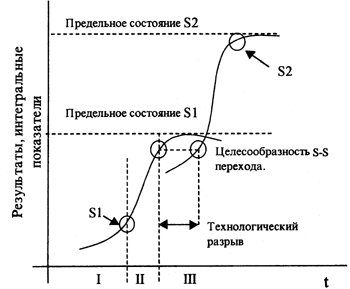
Astronautics is located in the S1 state - chemical rockets have rested against the limitations of the physics of our world. And until new technologies emerge that will take us to the next step, “tomorrow will be better than yesterday,” but not much. Will we see these technologies in the 21st century? Unknown - unfortunately, we are not playing computer strategy to know how many moves are left before a new study that will turn the world upside down.
Conclusion: In my opinion, in the 21st century, astronautics will develop linearly and rather slowly, but at the same time there is a small chance of a breakthrough in some area.
Still, she is beautiful!
Despite the fact that the space program did not justify the dreams of the 20th century, it is still attractive.
Space and space technology - it's beautiful. Starting a rocket or
landing the first stage is impressive.
Earth from orbit is beautiful, and
other planets with
stars and galaxies are not far behind.
Space and cosmonautics are interesting. We cannot yet take advantage of the knowledge that on Venus the tops of the mountains cover the “snow” of lead and bismuth, and on Titan, methane and ice play the same role as water and stone on Earth, but this is interesting. Space technology is
striking in its complexity - one can find devices that have
conquered femtometers (
10-15 meters) or are still
working 40 years later and at a distance of more than a hundred astronomical units. Even
funny tales for sixty years accumulated a great many.
Cosmos and cosmonautics inspire . Starting from the history of victories and defeats of the most talented people and ending with seemingly unremarkable photography, where the Earth
occupies less than a pixel - all this changes and makes better people who have come into contact with the cosmos.
Happy Cosmonautics Day!